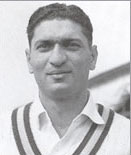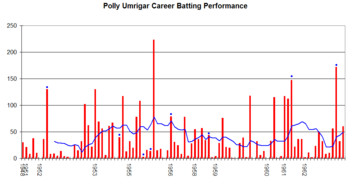Polly Umrigar facts for kids
 |
||||||||||||||||||||||||||||||||||||||||
| Personal information | ||||||||||||||||||||||||||||||||||||||||
|---|---|---|---|---|---|---|---|---|---|---|---|---|---|---|---|---|---|---|---|---|---|---|---|---|---|---|---|---|---|---|---|---|---|---|---|---|---|---|---|---|
| Full name |
Pahlan Ratanji Umrigar
|
|||||||||||||||||||||||||||||||||||||||
| Born | 28 March 1926 Bombay or Solapur, Maharashtra (see ) |
|||||||||||||||||||||||||||||||||||||||
| Died | 7 November 2006 (aged 80) Mumbai, Maharashtra, India |
|||||||||||||||||||||||||||||||||||||||
| Batting | Right-handed | |||||||||||||||||||||||||||||||||||||||
| Bowling | Right-arm offbreak | |||||||||||||||||||||||||||||||||||||||
| Role | All-rounder | |||||||||||||||||||||||||||||||||||||||
| International information | ||||||||||||||||||||||||||||||||||||||||
| National side | ||||||||||||||||||||||||||||||||||||||||
| Test debut (cap 47) | 9 December 1948 v West Indies | |||||||||||||||||||||||||||||||||||||||
| Last Test | 13 April 1962 v West Indies | |||||||||||||||||||||||||||||||||||||||
| Career statistics | ||||||||||||||||||||||||||||||||||||||||
|
||||||||||||||||||||||||||||||||||||||||
|
Source: CricInfo, 31 October 2021
|
||||||||||||||||||||||||||||||||||||||||
Pahlan Ratanji "Polly" Umrigar (March 28, 1926 – November 7, 2006) was a famous Indian cricket player. He played for the Indian cricket team from 1948 to 1962. He also played for teams like Bombay and Gujarat. Polly Umrigar was mainly a strong middle-order batsman. He could also bowl sometimes, using medium pace and off spin (a type of bowling).
He was the captain of the Indian team in eight Test matches between 1955 and 1958. When he stopped playing in 1962, he held many records for India. He had played the most Tests (59), scored the most Test runs (3,631), and hit the most Test centuries (12). He was also the first Indian player to score a double century (200 runs or more) in Test cricket. This happened against New Zealand in Hyderabad. In 1998, he received the C. K. Nayudu Lifetime Achievement Award. This is the highest honor given to a former player by the Indian cricket board.
Contents
Early Life and Beginnings
Polly Umrigar was likely born in Bombay, but some records say he was born in Solapur, Maharashtra. His father owned a clothing business. Polly grew up in Solapur. His family moved to Bombay when he was still in school.
He belonged to the Parsi community. This group was very important in Bombay cricket in the early 1900s. Polly started playing first-class cricket for the Parsis team when he was 18. This was in 1944. He also studied for a science degree at St Xavier's College. He even captained the Bombay University cricket team. Besides cricket, he was good at hockey and football.
Cricket Career Highlights
Starting His Test Journey
Polly Umrigar first got national attention in October 1948. He scored 115 runs without being out against the West Indies touring team. This amazing performance earned him a spot in his first Test match. He played against the same West Indies team in Bombay a few weeks later.
By 1949, Polly was a regular player for India. He scored many runs against visiting Commonwealth teams. In one match in Madras, he quickly went from 90 runs to 102 runs. He hit two sixes in a row off the bowling of Frank Worrell.
A year later, he struggled a bit against England at home. He was almost dropped from the team. But he got to play because another player was injured. Going in to bat at number 7, he scored 130 runs without being out. India won this match, their first ever Test victory! Polly said this was the best innings of his life.
Facing Challenges in England (1952)
In 1952, Polly Umrigar went to England. He scored a lot of runs in other matches. But in the Test matches, he found it very hard. He scored over 1,600 runs that season, including double centuries against university and county teams. However, he only made 43 runs in seven Test innings. He struggled against fast bowlers like Fred Trueman. He sometimes moved away from the ball, which made it hard to hit.
Many people talked about this series. But Polly Umrigar did much better against fast bowlers later on. He scored a century against Trueman in 1959. He also performed well against the strong West Indies fast bowlers in other series. He showed he could handle tough bowling.
He got back in form against Pakistan in 1952–53. He then scored 560 runs in the West Indies in 1953, with two centuries. In 1955–56, he made history by scoring 223 runs against New Zealand in Hyderabad. This was the first double century ever scored by an Indian in Test cricket.
Leading the Indian Team
Polly Umrigar first led India in some unofficial matches in 1953–54. He became the official Test captain in 1955. He captained India in eight Test matches in a row. India won two of these matches against New Zealand by a large margin.
He was replaced as captain for a short time in 1958. He was then asked to be captain again for a match in Madras. But there was a disagreement about which player should join the team. Polly wanted a batsman, but the cricket board president wanted a bowler. Because of this, Polly decided to step down as captain the night before the match. He played for India for three more years but never captained again.
Later Years in Test Cricket
In 1959, during a tour of England, Polly again scored many runs in practice matches. He hit three double centuries, including 252 runs not out against Cambridge University. This was the highest score by an Indian player outside India at that time. He also scored 118 runs in a Test match against England.
Polly's bowling was very helpful in India's first win against Australia in 1959–60. He helped Jasu Patel take wickets. He then scored three centuries against Pakistan in 1960–61. He also hit another century against England in 1961–62.
A few weeks later, India played a series in the West Indies and lost every match. But Polly Umrigar played one of his best innings. In the fourth Test, he scored 56 runs and then an amazing 172 runs not out. He also took 5 wickets in the West Indies' first innings. His 172 runs came when India was in trouble. He hit four fours in one over against the fast bowler Wes Hall. He ended that series with 445 runs and nine wickets. After returning home, he decided to retire from Test cricket because of a long-term back problem.
Polly Umrigar continued to play first-class cricket for Bombay for one more season. His last first-class match was in 1967–68.
Life After Cricket
After retiring, Polly Umrigar stayed involved in cricket. He managed Indian teams that toured New Zealand, West Indies, and Australia in the late 1970s. He was also the head of the national selection committee from 1978 to 1982. He served as the Executive Secretary of the BCCI and the Mumbai Cricket Association Secretary.
He wrote a book about cricket coaching. For a while, he was also in charge of preparing the pitch at the Wankhede Stadium. He received the Padma Shri award in 1962 for his contributions to sports. In 1998–99, he got the C.K. Nayudu Trophy. The national Under-15 cricket championship is named the Polly Umrigar Trophy in his honor.
Polly Umrigar was diagnosed with lymph cancer in 2006. He passed away in Mumbai on November 7, 2006. He was married to Dinu and had two sons and a daughter.
Legacy
- The BCCI (Board of Control for Cricket in India) created the Polly Umrigar Award to honor him. This award is given to the best male international cricketer in India each year.


